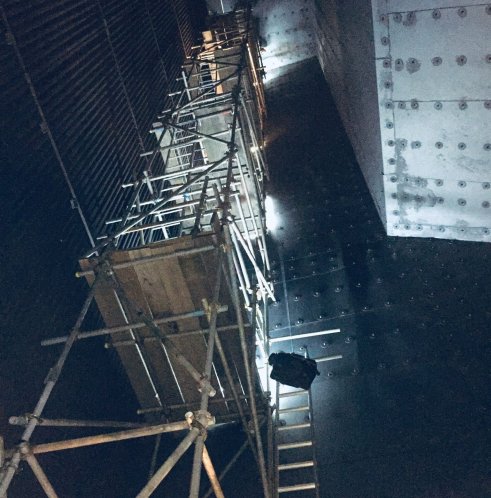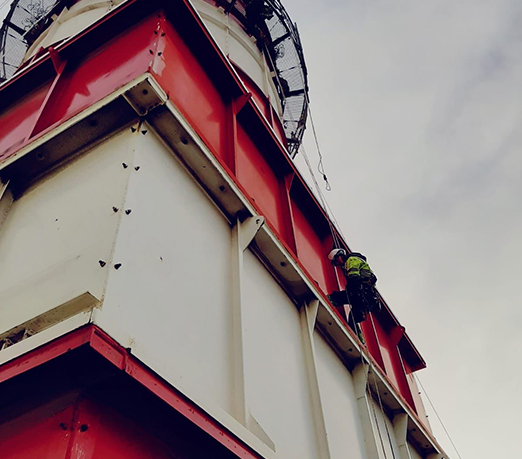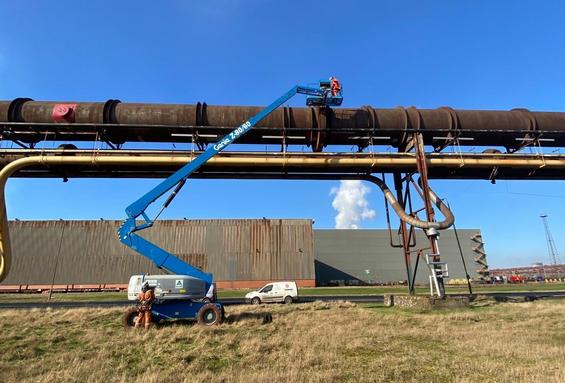“Hayley and STW have been a great asset to our company and have assisted us with their knowledge and professionalism.”
Positive Material Identification is a material analysis technique that can identify the exact composition of a component. With onsite and offsite options available, this technique can easily be tailored to your requirements, providing an accurate summary of the constituent elements within a material. Positive Material Identification is ideal for determining whether a material complies with the specification and, as such, possesses the properties that are required for its intended use. You can rely on our expertise to carry out these inspections efficiently, effectively, and with minimal disruption to your day-to-day processes. Call 01795 432 634 to discuss your requirements with a member of our team.

What is Positive Material Identification?
Positive Material Identification (PMI) can be used to analyse and verify a material’s elemental composition. Whilst this inspection can be carried out on any material, it is most commonly used on metallic components to ensure that they conform to the correct specification. PMI is often used to identify the exact material that was used in the manufacture of an in-service component so that an appropriate repair can be carried out. Several techniques can be used to carry out PMI, including onsite and offsite options. Our team will be able to identify and carry out the right approach for your requirements.
Hear from our clients
“Great service, friendly, helpful and accommodating.”
“ST&W Inspections are a very reliable supplier of ours. They are quick to support us at with any inspections that we require sometimes on a short turnaround. This includes completing paperwork that we require to give to our clients and also if an inspection is required on site, they are always reliable to be able to meet our demands. Also, their knowledge of the industry is massive support to us when we require information when we might not have the answers.“
“It is genuinely a pleasure doing business with you and I look forward to continuing the relationship and using your services“
Discuss your requirements with our team
To learn more about our Positive Material Identification service, contact our team. You can call 01795 432 634, email info@standwinspections.co.uk or fill out our contact form for a response within 24 hours.
Why is PMI needed?
Positive Material Identification is a versatile technique with a wide range of industrial applications. Typical uses of PMI include:
- Identifying the exact chemical composition of a material.
- Checking that a material has been manufactured to the correct specification.
- Making sure that a material will exhibit the required properties, such as corrosion resistance.
- Ensuring that the correct filler material has been used in a welded component.
- Determining if a material is compliant with the applicable industry standards.
- Locating any mixed-up alloys.
Positive Material Identification: The process
The PMI process will vary according to the exact technique that is used. In many cases, testing can be performed onsite using handheld X-Ray Fluorescence equipment. This low cost, portable approach is highly efficient, rapidly and accurately identifying a material’s constituent elements. For large projects, testing can be carried out within a laboratory setting using samples. This removes the need to adjust your processes to accommodate an onsite inspection team. Regardless of the method used to conduct PMI, it’s important to ensure that testing is carried out on a representative sample so that accurate results can be produced.

Explore our NDT offering
We can provide a wide range of NDT methods to assess the integrity of your weld or component. Our sister company, S.T & W Laboratories, can be consulted for DT techniques such as Fracture and Hardness Testing.

Ultrasonic Inspection
Ultrasonic Testing identifies discontinuities on or near the surface of a component using ultrasonic sound waves.

Visual Inspection
Visual Inspections are carried out by trained technicians who can locate any surface defects that may be present.

Magnetic Particle Inspection
Magnetic Particle Inspection detects surface flaws using an electromagnetic yoke to manipulate a magnetic field.

Liquid Penetrant Testing
Liquid Penetrant Testing produces surface indications that a technician can interpret to locate flaws.

District Heating NDT
Using the bespoke NDT method we’ve developed, we can accurately, safely, and reliably assess thin wall pipelines.

Phased Array Ultrasonic Testing
Phased Array is an advanced NDT technique that produces a detailed internal image of a component.
Working with
S.T & W Inspections
As a knowledgeable and flexible NDT company, we can carry out the inspections you need to feel confident in the quality of your output. Our team are highly responsive and can attend your site at short notice if required. We’re here to help ensure your welds are compliant with the standards in your industry.

Responsible Welding Co-Ordinators
We can provide RWCs (Responsible Welding Co-ordinators) to supervise your welding activities. They will ensure that your welders are following the specified procedures and you will have access to their expertise on a monthly or quarterly basis during site visits. You can also request their support for developing new procedures if your requirements change.
Contact
S.T & W Inspections
To enquire further about Positive Material Identification, get in touch. Our experienced team are available on 01795 432 634 and via email on info@standwinspections.co.uk.
